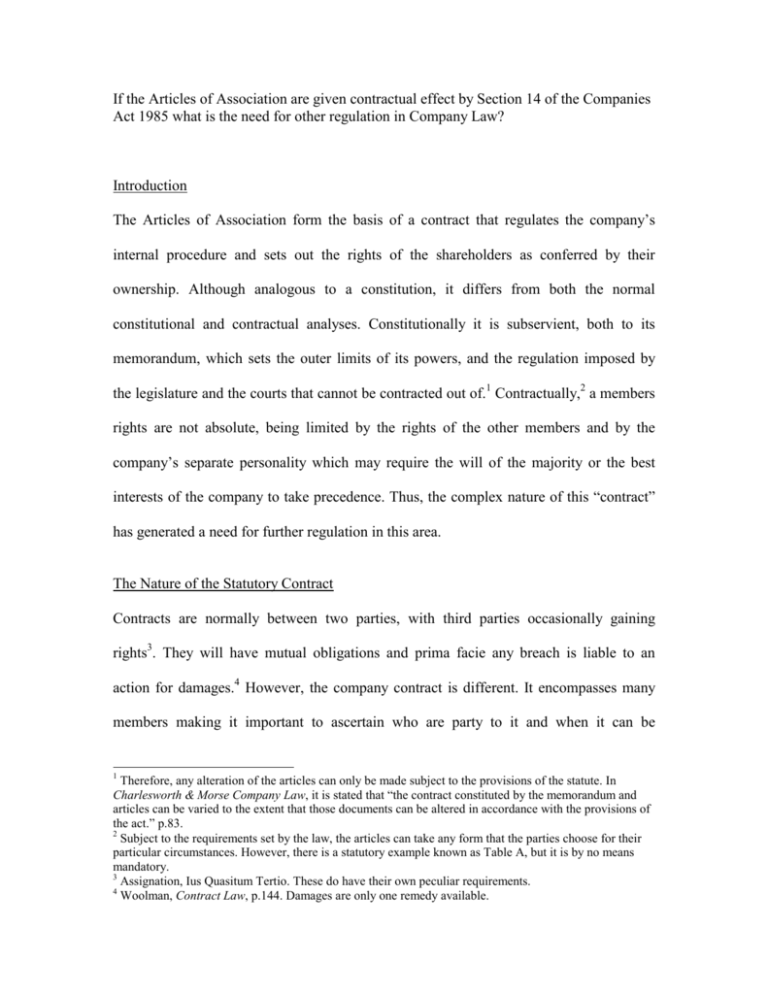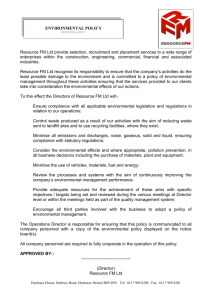If the Articles of Association are given
advertisement

If the Articles of Association are given contractual effect by Section 14 of the Companies Act 1985 what is the need for other regulation in Company Law? Introduction The Articles of Association form the basis of a contract that regulates the company’s internal procedure and sets out the rights of the shareholders as conferred by their ownership. Although analogous to a constitution, it differs from both the normal constitutional and contractual analyses. Constitutionally it is subservient, both to its memorandum, which sets the outer limits of its powers, and the regulation imposed by the legislature and the courts that cannot be contracted out of.1 Contractually,2 a members rights are not absolute, being limited by the rights of the other members and by the company’s separate personality which may require the will of the majority or the best interests of the company to take precedence. Thus, the complex nature of this “contract” has generated a need for further regulation in this area. The Nature of the Statutory Contract Contracts are normally between two parties, with third parties occasionally gaining rights3. They will have mutual obligations and prima facie any breach is liable to an action for damages.4 However, the company contract is different. It encompasses many members making it important to ascertain who are party to it and when it can be 1 Therefore, any alteration of the articles can only be made subject to the provisions of the statute. In Charlesworth & Morse Company Law, it is stated that “the contract constituted by the memorandum and articles can be varied to the extent that those documents can be altered in accordance with the provisions of the act.” p.83. 2 Subject to the requirements set by the law, the articles can take any form that the parties choose for their particular circumstances. However, there is a statutory example known as Table A, but it is by no means mandatory. 3 Assignation, Ius Quasitum Tertio. These do have their own peculiar requirements. 4 Woolman, Contract Law, p.144. Damages are only one remedy available. enforced. The provisions of Section 14 do not recognise the company as being party to the contract, thus ignoring its separate legal entity1, and provides only that it is binding as if signed and sealed by each member. Thus, the shareholders are bound to the company and, although not statutorily provided for, the company is bound, by the Articles, to the member2. However, the shareholders can only enforce their rights qua members3, and whilst the articles form a contract between members it is normally only enforceable through the company4, unless the member has a personal right5. The regulation effectuating this will be discussed below6, but note that an “outsider” right, ie one not related to the “collective constitutional rights”7, cannot be enforced. As “outsider’s” can include directors, perhaps this regulation requires alteration.8 The most important consideration of the statutory contract is how, and especially why, it differs from a standard contract. The purpose of this contract is to regulate the owners rights in what is a separate legal entity, whilst ensuring the longevity of the relationship. It comprises a general long-term goal to profit the shareholders and therefore must be able to ensure the continued relationship of the shareholders. This makes it quite distinct from standard contract law, which deals with “discreet transactions” and whose remedies “put an end to the dispute; and, since resolution of the dispute is all that remains of the 1 Griffin, Company Law Fundamental Principles, p.71. Morse, Charlesworth & Morse Company Law, p.81 3 Beattie v E. & F. Beattie Ltd [1938] Ch 708; Eley v Positive Government Security Life Insurance [1876] 1ExD 88. 4 Salmon v Quinn & Axtens [1909] 1 Ch 311 per Farwell L.J. This is because the company is the only real plaintiff in such a case. See MacDougall v Gardener (1875) 1 ChD 13. 5 Rayfield v Hands [1960] Ch.1 6 Namely, the rule in Foss v Harbottle that, subject to exceptions, disputes must be through the company. 7 Griffin, Company Law Fundamental Principles, p77. 8 For example, in Salmon v Quinn & Axtens [1909] 1 Ch 311 the director was given the power to veto but he was also a member, and this appeared to be why he managed to enforce his right. 2 discreet transaction, the process is a relatively clean one.”1 The company contract cannot be dealt with in this way as it is desirable that the relationship continues, therefore certain remedies, such as setting aside “on the grounds of misrepresentation, mistake, undue influence, or duress,”2 are not available. If the contract granted inviolable rights that parties could always litigate to protect, this would “fail to take account of the long duration and changing nature of the relationships involved.”3 However, the courts do not have the power to alter the articles4 and whilst they construe them to give reasonable business efficacy, they are “limited to the words of the articles when implying terms.”5 Thus, the relational approach suggests that disputes should always be dealt with, firstly, by “the company’s internal dispute-resolution machinery.”6 If a company needs to alter its contract, the members may do so by special resolution7, subject to certain built in protections to which we will now turn. The Nature Of The Statutory Contract Regulation There are three major issues that the law must regulate; the company’s best interests; the minority and majority shareholders rights; and the problem of proprietary interest. The major problem is that a share provides a right in property, and therefore the attached vote 1 I.A.MacNeil, Contracts: Adjustment of Long-Term Economic Relations Under Classical, Neo-Classical, and Relational Contract Law, (1978) 72 North Western University Law Review 854 at p.891. 2 Griffin, Company Law Fundamental Principles, p.72. See also Bratton Seymore Service Co Ltd v Oxborough (1992) BCC 471. 3 R.R.Drury, The Relative Nature of a Shareholders Right to Enforce the Company Contract, [1986] CLJ 219. 4 Scott v Frank F Scott (London) Ltd [1940] Ch 794. 5 Mayson, French & Ryan, Company Law, at p.96. Of course, under normal contract law, the Court can look at any extrinsic evidence as to the party’s intentions, unless the contract states that this cannot be done, under the Contract (Scotland) Act 1997. 6 R.R.Drury, The Relative Nature of a Shareholders Right to Enforce the Company Contract, [1986] CLJ 219 7 Section 9 of the Companies Act 1985. is also a property right1. Thus, a shareholder can exercise his vote in any way he likes notwithstanding any personal interest that conflicts with the interests of the company2. He may even enter a voting agreement3, creating a personal obligation enforceable in the courts4. Whilst Farrar5 suggests that a forthcoming European Directive may prevent voting agreements, and restrain members with conflicting personal interests from voting, at present “those who have rights of property are entitled to exercise them whatever their motives may be for such exercise.”6 As this conflicts with the interests of the company and other shareholders, it has been qualified. Majority rule in company law is a long established principle7. It provides an equitable solution to determining many disputes, and culminated in the Foss v Harbottle rule8. It states that damage done to the company by outsiders may only be remedied by corporate action. As the court’s are reluctant to interfere in internal management, this resulted in majority rule9. The Courts have used this to justify not interfering in a company’s internal affairs1, giving the majority power to prevent a member litigating when a breach of the articles has occurred. This helps prevent “futile actions” and “companies being torn apart 1 Carruth v Imperial Chemical Industries, Ltd. [1937] A.C.707; Pender v Lushington (1877) 6 Ch.D.70; Northern Counties Securities Ltd. v Jackson & Steeple Ltd. [1974] 1 W.L.R. 1133. 2 F.G.Rixon, Competing Interests and Conflicting Principles: An examination of the power of Alteration of Articles of Association, (1986) 49 MLR 446, p.465. 3 Welton v Saffery, [1897] A.C.299, where it was stated, per Lord Davey at p.331, that it is a valid personal agreement but would “not become a regulation of the company, or be binding on the transferee’s of the parties to it, or upon new or non-assenting shareholders.” 4 Russell v Northern Bank Development Corporation Ltd [1992] 1 WLR 588; Eilis Ferran has suggested at p.344 of her article, that the judgement indicates that under different circumstances, the Court would grant an injunction to enforce such voting agreements. 5 J.H.Farrar & B.M.Hannigan, Farrar’s Company Law, p.130. 6 per Jessel MR, Pender v Lushington (1870) 6 ChD 70, at p.75. 7 R v Varlo (1775) 1 Cowp. 248, 250; Attorney-General v Davy (1741) 2 Atk.212. 8 (1843) 2 Ha. 461; See also Mozley v Alston (1847) 1 Ph. 790. 9 K.W.Wedderburn, Shareholders Rights And The Rule In Foss v Harbottle, [1957] CLJ 193, p.196. by litigation”2, thus supporting the relational approach, in what may be termed justified discrimination3. Majorities can also ratify acts that are Intra Vires by ordinary resolution, a power capable of abuse, but this may be beneficial to the company4. This right is qualified, however, by rules designed to protect minorities from unfair oppression. These rules are generally termed the “exceptions” to the Foss v Harbottle doctrine. In Edwards v Halliwell5, four were defined. Firstly, any act that is Ultra Vires the company, either as prohibited by the memorandum or statute, or illegal, is incapable of being ratified by any majority. Secondly, a “fraud on the minority” would relax the rule that a majority must approve litigation because, without this, the fraudulent parties could possibly prevent an action. This would apply, especially, to shareholder directors who abused their power and then ratify their acts. The third category relates to someone having a personal right, as enforcement through the company is unnecessary6. This will be a right that every shareholder is granted with ownership, such as the right to vote7. Finally, the “special minorities” exception. R.R.Drury stated that “the automatic barrier to suit has been set at the level of an ordinary majority of the general meeting. It will thus have no application when the rules of company law require some higher majority, or 1 See Carlen v Drury (1812) 1 Ves & B 154, where Lord Eldon stated that “the court could not undertake the management of every brewhouse and playhouse in the kingdom”; Burland v Earle [1902] AC 83; 2 K.W.Wedderburn, Shareholders Rights and the Rule In Foss v Harbottle, p.195. 3 See, as an example, Sidebottom v Kershaw, Leese & Co [1920] 1 Ch 154, where directors were allowed to pass a resolution to acquire a member’s shares at fair value when it was in the bona fide best interests of the company. This was not a case where the majority blocked the litigation, but it was justifiable discrimination. 4 P.G.Xuereb, The Limitation on the Exercise of Majority Power, (1985) 6 Co Law 199, p.201 5 [1950] 2 All E.R., per Jenkins L.J at p.1067. See also K.W.Wedderburn, , Shareholders Rights and the Rule In Foss v Harbottle, [1957] CLJ 193. 6 I am only talking here of the rights that are derived purely from the section 14 contract. 7 Pender v Lushington (1877) 6 Ch.D 70; There are numerous other examples of personal rights, such as Rayfield v Hands [1960] Ch. 1, where the plaintiff enforced his right to have the directors buy his shares from him. where the matter is such that it is inappropriate to refer it to an ordinary majority.”1 Inappropriateness will depend on the exact facts2, but in the case of an alteration of the articles the law demands a special resolution3. Such alteration requires members to act, “not only in the manner required by law, but also bona fide for the benefit of the company as a whole.”4 What does this mean? Some cases suggest it is the benefit of the company as a separate entity,5 whilst others suggest that disputes regarding members rights inter se cannot be distinct from the shareholders6. Both situations certainly place a duty of good faith on shareholders, with one writer arguing this should be extended to all general meeting powers7, because it can ratify acts Intra Vires the company. This is necessary to protect minorities. Whilst he suggests that good faith and proprietary interest can act concurrently, his contention that acts not compliant with good faith should be liable to impeachment would only amount to more unnecessary litigation8. Statute has provided another remedy to minority shareholders, allowing any member to petition the court on the grounds that the company’s affairs are being run in an unfairly prejudicial manner9. Such actions do not need to be oppressive1, and the court is empowered to make 1 R.R.Drury, The Relative Nature of a Shareholders Right to Enforce The Company Contract, p.240. Two well known cases were that of Edwards v Halliwell [1950] 2 All E.R, and Quinn and Axtens, Ltd v Salmon [1909] AC 442. 3 Companies Act 1985, s.9. 4 Allen v Gold Reefs of West Africa, Limited [1900] 1 Ch.656 per Lindley M.R at p.671. 5 Saloman v Saloman & Co. [1897] A.C.22 per Lord Halsbury L.C. at p.30 who stated that the company as a whole meant as an “independent person with its rights and liabilities appropriate to itself.” Thus, when it was suggested in Sidebottom v Kershaw, Lease & Co. [1920] 1 Ch.154 that company as a whole included the shareholders, this argument was rejected. 6 See Peters American Delicacy Co. Ltd v Heath (1938-1939) 61 C.L.R. 457; Greenhalph v Arderne Cinema’s, Ltd [1951] 1 Ch.286. 7 Peter G Xuereb, The Limitation On The Exercise Of Majority Power, (1985) 6 Co Law 199. Indeed, he contends that this is what Lindley MR meant in the Allen case when he said “subject to all those principles of law and equity which are applicable to all powers conferred on majorities and enabling them to bind minorities,” 8 Even though he qualifies this contention, at p.208, by saying they are concurrent to an extent, it is surely fanciful to say, effectively, that you can vote as you please so long as half the voters vote in the company’s interest! 9 s.459(1), Companies Act 1985. 2 whatever order it thinks fit to remedy the matter2. Thus, so long as a petition is well founded, this can be used without the consent of the majority to allow relief. Conclusion The nature of the statutory contract is far removed from that of a normal contract in that it binds a potentially large group of individuals in a relationship where their proprietary rights are, necessarily, qualified by the rights of others. Furthermore, the nature of this association is to long term prosperity through the combined interest in what is a separate entity. It is this long-term relational approach that renders classical contract law remedies ineffective in resolving disputes and makes further regulation necessary. The regulation prescribed by law attempts to give as much autonomy to the members to resolve disputes without the damaging recourse to the courts, and so the principle of majority rule is seen as the most equitable means of ensuring this. But the law will intervene when the power given to such majorities is used in order to disadvantage minorities or, in certain circumstances, the company. Further, the company cannot contract out of the regulation imposed by law3. Thus the law walks, sometimes clumsily, a fine line between balancing an individual’s proprietary interest and the good of, either, the majority interest or the company’s interest. In most cases, these will be concurrent. 1 Under s.210 of the Companies Act 1948, the equivalent term to s.459, the behaviour had to be oppressive before an action was allowed. See R.Gregory, The Section 20 Contract, (1981) 44 MLR 526; The Jenkins Committee stressed that the test was of unfair prejudice, not of oppression. See Cmnd. 1749, para. 212. 2 Section 461(1). 3 Southern Foundries (1926) Ltd v Shirlaw [1940] A.C.701; Russell v Northern Bank Development Corporation Ltd [1992] 1 WLR 588. Word Count : 1510 BIBLIOGRAPHY Textbooks 1) Farrar, J.H, & Hannigan, B.M, Farrar’s Company Law, 1998,4th edn, Butterworths, Edinburgh. 2) Griffin, S., Company Law Fundamental Principles, 1996, 2nd edn., Pitman Publishing. 3) Mayson, S.W, French, D, & Ryan, C., Mayson, French & Ryan On Company Law, 1998, 15th edn, Blackstone Press, London. 4) Morse, G., Charlesworth & Morse Company Law, 1995, 15th edn., Sweet & Maxwell 5) Oliver, M.S., & Marshall, E.A., Company Law, 1994, 12th edn, M&E Handbook Series. 6) Woolman, S., Contract, 1994, 2nd edn., W.Green/Sweet & Maxwell. Articles 1) Davenport. B.J., What did Russell v Northern Bank Development Corporation Ltd Decide?, [1993] LQR 553. 2) Drury, R.R., The Relative Nature Of A Shareholders Right To Enforce The Company Contract, [1986] CLJ 219. 3) Ferran, E., The Decision Of The House Of Lords In Russell v Northern Bank Development Corporation Linited, [1994] CLJ 343 4) Gregory, R., The Section 20 Contract, (1981) 44 MLR 526 5) MacNeil, I.A., Contracts: Adjustment of Long-Term Economic Relations Under Classical, Neo-Classical, and Relational Contract Law, (1978) 72 North Western University Law Review 854. 6) Rixon, F.G., Competing Interests And Conflicting Principles: An Examination Of The Power Of Alteration Of Articles Of Association, (1986) 49 MLR 446 7) Wedderburn, K.W., Shareholders Rights And The Rule In Foss v Harbottle, [1957] CLJ 193 8) Xuereb, P.G., The Limitation On The Exercise Of Majority Power, (1985) 6 Co Law 199 Statutes 1) Companies Act 1985 2) Contract (Scotland) Act 1997 Cases Allen v Gold Reefs of West Africa Limited [1900] 1 Ch.656. Attorney-General v Davy (1741) 2 Atk.212. Beattie v E. & F. Beattie Ltd [1938] Ch 708. Bratton Seymore Service Co Ltd v Oxborough (1992) BCC 471. Burland v Earle [1902] AC 83. Carlen v Drury (1812) 1 Ves & B 154 Carruth v Imperial Chemical Industries Ltd [1937] A.C.707 Edwards v Halliwell [1950] 2 All E.R Eley v Positive Government Security Life Insurance [1876] 1 ExD 88. Foss v Harbottle (1843) 2 Ha. 461. Greenhalph v Arderne Cinema’s Ltd [1951] 1 Ch.286. MacDougall v Gardener (1875) 1 ChD 13. Mozley v Alston (1847) 1 Ph. 790. Northern Counties Securities Ltd v Jackson & Steeple Ltd. [1974] 1 WLR 1133 Pender v Lushington (1877) 6 Ch.D.70 Peters American Delicacy Co. Ltd v Heath (1938-1939) 61 C.L.R. 457. Quinn & Axtens v Salmon [1909] AC 442 R v Varlo (1775) 1 Cowp. 248. Rayfield v Hands [1960] Ch 1. Russell v Northern Bank Development Corporation Ltd [1992] 1 WLR 588. Saloman v Saloman & Co. [1897] AC 22. Scott v Frank. F. Scott (London) Ltd [1940] Ch 794 Sidebottom v Kershaw, Leese & Co [1920] 1 Ch 154 Southern Foundries (1926) Ltd v Shirlaw [1940] A.C.701 Welton v Saffery [1897] A.C.299





